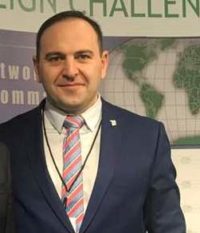A nation must think before it acts.
The Future of US Strategic Interests in the South Caucasus: Challenges and Opportunities for the Biden Administration
About the Event
Join FPRI and the Atlantic Council of Georgia for a half-day conference.
The Future of US Strategic Interests in the South Caucasus: Challenges and Opportunities for the Biden Administration.
For decades, the United States has seen the South Caucasus as a strategically important region and has heavily invested in development, security, and democracy assistance there. However, the region is now more volatile than it has been in decades due to Russia’s increasing role and influence over Georgia, Armenia, Azerbaijan, and their neighbors. Deteriorating domestic conditions amid political chaos, territorial conflict, a raging pandemic, and an anti-democratic wave have contributed to regional instability as well. Russia still occupies 20% of Georgia’s territory. The Kremlin has also penetrated civil society and political circles in Georgia and spreads disinformation, which fuels Tbilisi’s endless political crises. One year ago, Moscow brokered a ceasefire deal between Yerevan and Baku over the Nagorno-Karabakh conflict, placing its peacekeeping forces in the embattled territory. Washington and Brussels seem to be losing power and influence in the South Caucasus to other powerbrokers, such as Moscow, Ankara, Tehran, and Beijing. Is it in Washington’s interest to more closely engage with its partners in the South Caucasus? Why does this space still hold strategic importance? What should the Biden administration do to discourage further democratic backsliding and secure the decades of American investments in the region?
Panel One: The Current State of Democracy in Georgia
On October 1, Georgia's former president Mikheil Saakashvili was arrested in Batumi on charges of corruption and abuse of power while in office from 2004-2012. On October 2, Georgia held hotly contested municipal elections. The election took place against the backdrop of months-long parliamentary standoffs and political crises, the still-raging COVID-19 pandemic, Tbilisi’s continued fall from grace with its Western partners, and deep societal divides fueled by Russian disinformation and propaganda. What do the outcome of the election, and Saakashvili's arrest, tell us about the future of Georgia’s struggling democracy?
Speakers: Giorgi Muchaidze, Nino Evgenidze, Eka Gigauri, Nino Dolidze
Moderated by: Miro Popkhadze
Panel Two: US Foreign Policy Challenges and Opportunities in the South Caucasus
Where do the countries of the South Caucasus fall in U.S. perceptions of great power competition in Eurasia? Is it in America’s interest to more closely engage with its partners in the South Caucasus? What strategic importance does the region hold for the United States? What should the Biden administration do to prevent further democratic backsliding and foster deeper Western engagement?
Speakers: Ian Kelly, David Kramer, Batu Kutelia, Vasil Dato Sikharulidze
Moderated by: Maia Otarashvili
FPRI is happy to provide this event free of charge thanks to the generous support of our members, partners, and event attendees. If you are not currently a member, the suggested donation is $25.
If you have any questions or concerns, please contact our events coordinator, Kayla Wendt at kwendt@fpri.org.
Speakers

Nino Evgenidze - Nino Evgenidze serves as an Executive Director at the Economic Policy Research Center (EPRC). She is a co-founder of the Tbilisi International conference together with McCain Institute for International Leadership and Leadership Academy for Development with Stanford University Center for Democracy, Development, and Rule of law. Nino is also a co-founder of the Fukuyama Democracy Frontline Center.

Eka Gigauri - Eka Gigauri is the Executive Director at Transparency International Georgia and a former member of the board of directors at Transparency International global movement.

Batu Kutelia - Ambassador Batu Kutelia is a Senior Fellow in FPRI's Eurasia Program. He is a member of the board at the Atlantic Council of Georgia and a Next Generation Leader Fellow at the McCain Institute for International Leadership.

David J. Kramer - David J. Kramer is Senior Fellow in the Vaclav Havel Program for Human Rights & Diplomacy and Director for European and Eurasian Studies at Florida International University’s Steven J. Green School of International and Public Affairs.

Miro Popkhadze - Miro Popkhadze is a Fellow in the Eurasia Program at the Foreign Policy Research Institute.

Ian Kelly - Ian Kelly is a retired senior foreign service officer who last served as the United States Ambassador to Georgia, from 2015 to 2018. He previously served as the U.S. Ambassador to the Organization for Security and Cooperation in Europe (OSCE) from 2010 to 2013. Prior to these ambassadorships, Amb. Kelly held a variety of high-level positions at the U.S. State Department, including serving as Secretary Clinton’s spokesman (2009-2010). He has extensive experience working on issues relating to NATO, Russia, the Caucasus, Central Asia, and the Balkans. He has an MA from Northwestern and a PhD from Columbia University.

Vasil Sikharulidze - Ambassador Vasil (Dato) Sikharulidze is a Senior Fellow in FPRI's Eurasia Program. He is a former Georgian Ambassador to the US and former Minister of Defense.




